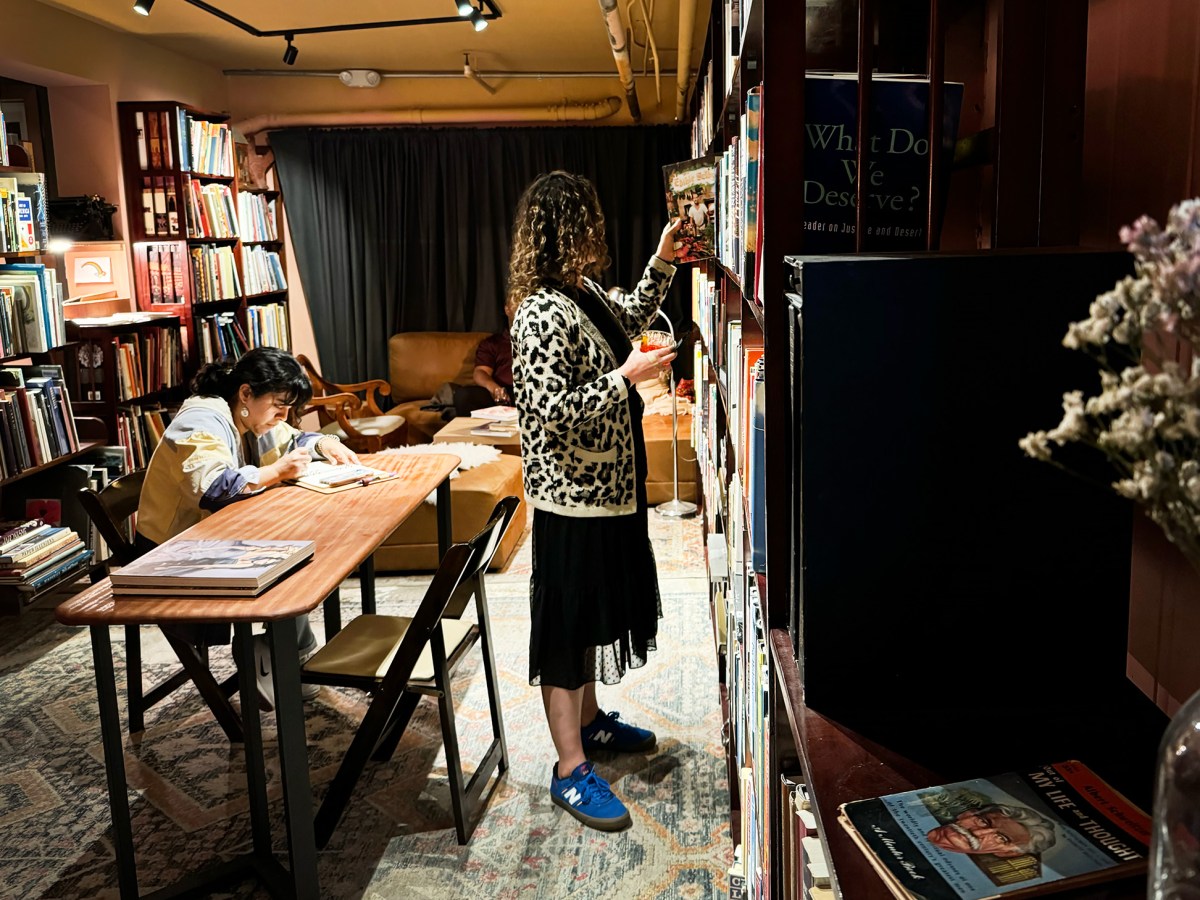It’s usually not hard to find seating on a Thursday evening at Philomena in the San Antonio neighborhood of East Oakland. But by 6 p.m. on the first Thursday of June, the place was packed with at least 50 people filling every seat and many more standing around with glasses of beer or kombucha and a slice of pizza in their hands.
People were there for a San Antonio Station Alliance (SASA) meet-up. Most were from the neighborhood, and had been coming to Philomena since it opened in 2016. Ben Matlaw, one of the volunteer organizers for SASA who helped run the event, had his first date there with his now-wife in early 2017. People were there to show their support for SASA’s cause, which is to open a new San Antonio Bart station between Lake Merritt and Fruitvale stations. Some other notable attendees were Bart District 4 Director Robert Raburn and two candidates for the Oakland City Council at large seat, Charlene Wang and Rowena Brown.
Philomena
1801 14th Ave., Oakland; www.philomenapizza.com
Open 11 a.m. to 9 p.m. Tuesday through Sunday, 4-9 p.m. Mondays
Volunteer SASA organizers Youngchae Lee, Sara Rowley and Matlaw held this event so supporters could meet each other and put faces to names. The other reason was to support Philomena, which just four weeks prior, on May 1, sent out a letter titled the state of emergency community letter, asking their customers for help because they are in danger of closing.
When SASA members heard that Philomena might close, they wanted to help in any way they could.
“We’re a small and tight-knit community with very few businesses,” Matlaw said. “We decided it was only natural for us to take action and try and support them as just another neighborhood group.”

Costs go up, sales go down
Warren Rector, who started Portal near Lake Merritt in Oakland, opened Philomena in 2016. The restaurant struggled a bit in the first couple of years. Michael “Rico” Richard, the co-owner of Philomena with his wife, Rachel Fenyves, bought the restaurant in 2019. Richard had been working with Philomena since it opened.
“I really came into the restaurant after working a lot in the business and on the floor and meeting the community,” Richard said. “And we lived right here when we first purchased the place.”
For these reasons, Richard said when he and Fenyves first bought Philomena, it was doing pretty well. Philomena’s accountant, Lauren Aubrey who runs LemonTree Accounting Team, echoed this sentiment.
“He’s so good at managing it,” Aubrey said. “And just made a really vibrant place.”
Even through the COVID shutdowns they were doing relatively well.
“We were already set up for to-go, we offered this to-go brunch program that worked pretty well,” Richard said. “Things were going great.”
That changed in 2023 when things started opening back up. Richard said he felt like there was a travel wave, where everyone was leaving to go see family or travel abroad.
“We’ve realized how much of a community we have. It’s given us new energy to keep working and keep trying.”
Michael “Rico” Richard
This wave also overlapped with an increase in crime for Philomena. Toward the end of 2022, just before Christmas, they had a break-in that cost 10s of thousands of dollars. Then, in early 2023, they had two more break-ins. On top of that, to-go sales were starting to fade as people started dining out again, but those in-person diners weren’t returning in droves to Philomena. In previous years, Richard said Philomena was recording steady growth of 15-20% annually. All of a sudden they saw a decline of between 15-30%. For a restaurant, that kind of drop in business can lead to closure, Richard said.
“All my costs were going up,” Richard said. “I was putting a lot of money out for repairs and securing the building. So costs all over the place were going up, and sales were going down and stagnating.”
Aubrey started her company in 2016, and now has around 45 clients in the Bay. For all her Oakland clients such as Portal and the Stork Club, she’s seen this same trend that Richard is describing for Philomena.

Many of her clients are experiencing revenue declines of 20-25% compared to last year, which she says isn’t sustainable and is attributable to multiple reasons. One is the recent minimum wage increase for the fast food industry in California—chains with 60 or more locations nationwide must pay workers a minimum of $20 per hour. This leads to employees leaving or expecting their current employers to match the higher wages, increasing the cost of labor for restaurants. Other reasons she mentioned are increasing food prices, fewer customers dining out in Oakland, and third-party take-out apps that take a percentage of restaurant sales for their service. This has led to restaurants’ prime costs, or total sum of labor costs and the costs of goods sold, rising above 70%. Ideally, they shouldn’t be over 65% in order to make a profit. After seeing the recently completed first-quarter reports this year, Aubrey feels like none of her Oakland clients have really made money.
“Everything is hitting the restaurants and I’m a foodie and I love going out to eat, and I see so many good restaurants just closing down and I don’t know what’s going to be left in five years,” Aubrey said.
Philomena has not been immune to these changes, including the expectations around labor. Employees want sick pay, time off, and full benefits.
“Which, of course, all of us want to offer,” Richard said. “I would like to offer it to myself. But at the same time, they [customers] want our prices to be this great value. And those two things just aren’t congruent, one affects the other pretty directly.”
He said it’s been a struggle trying to make sure they’re not cutting corners on quality and doing well for the community while also ensuring that the restaurant and its 12 employees can all pay their bills.

“Serious and desperate”
Before sending the letter, Richard was spending a lot of money on marketing to attract new customers, and he opened a new take-out location in West Oakland in February to expand their base. These steps weren’t enough to save Philomena.
“So you get to a place where things are really starting to get serious and desperate and we just decided to send a letter out to the community,” Richard said.
When they sent this letter, they were weeks out from having to start telling vendors that they didn’t have the cash in their accounts to pay invoices. In the years since 2019 there have been individual months when Philomena lost money, but usually the month before or the month after would be profitable enough to continue forward momentum.
This last year though, Richard said the opposite pattern emerged. They had to start shaving things off slowly, moving an employee coming in at 9:30 a.m. to 9:45, just to save a bit in labor.
They’ve had to increase prices to keep up with rising costs.
The letter starts: “Over the past year so many beloved Oakland restaurants have had to close. We’re sad to say goodbye to these local gems—and it looks like Philomena may be next.”
Philomena appealed to their community. They asked people to dine in, order directly instead of through third-party apps, check out their new take-out location in West Oakland, and fill out a survey. The survey asked customers what they liked, what they didn’t, and how they could improve.
Richard did not expect the response that has poured in these last couple of weeks.
“We sent it to maybe 2,000 people, I thought I’d get maybe 10 replies,” Richard said. “We ended up with over 100 within a few days, and immediately within 30-36 hours, we were starting to see a lot more people come in the door all of a sudden.”

Finding common ground with customers and community
David McKay has lived in the San Antonio neighborhood for 12 years, and he has been to Philomena multiple times since they sent the letter.
“It only takes the letter to realize you might lose the restaurant,” McKay said.
By the time I spoke to Richard in late May, they were already up to 200 respondents. A lot of them were asking for more events and some menu changes, so Philomena has started to implement what the community is asking for. They’ve had multiple events already including a classic car meet-up and live music. The turnout for these has been great.
“We’ve realized how much of a community we have,” Richard said. “It’s given us new energy to keep working and keep trying.”
Now, a little more than a month after they sent the letter out, Philomena is up to breaking even. Richard said that while this has been amazing, the root problems linger. While sales are improving this year, it’s in comparison to last year which was down 15-30%, and the numbers are still down from previous years.
“It’s mentally taxing,” he said.
Before COVID, the San Antonio Station Alliance (SASA) would sometimes do community cleanups. When they were around Philomena, Richard said he would invite them in, they would get brunch, and he would give them discounts for helping out the community. Once COVID hit though, he said Philomena lost touch with this community group. When SASA reached out asking to host an event there, Richard and Fenyves were happy to host them.
“They need a hub, and that’s us, and we need them to be coming in and having discussions about the community. So it’s a win-win,” Richard said. He added that Philomena would be happy to have a Bart station down the street, and that SASA is working towards a really practical neighborhood improvement.
Matlaw said he sees this common ground as well. He said that Philomena is a center for the community, but it’s also in the middle of nowhere. The area doesn’t have a lot of foot traffic. Matlaw and Rowley mentioned that they can see this being a deterrent for some people to dine at Philomena, even for themselves sometimes. Matlaw sees this as an opportunity for the city of Oakland to help make a difference.
“There is a role for the city, and BART, and some of these public transit agencies to play too,” Matlaw said. “Not just to not hurt businesses, but to actually really help businesses.”
With all of this, Richard emphasized that the letter is a success story, helping him realize Philomena didn’t lose its community, and the community is there to support them, but
it’s also only the start of getting past their challenges.
“All the business owners still really need a lot of support, not from just the customers but from the city,” Richard said. “We need help in so many different ways. So while there’s definitely a success story with what happened, I feel like it’s very short-lived. There’s a lot of headwind still.”
Now that the neighborhood has been alerted to the potential of losing Philomena, there’s hope in how much the community has been showing up.
As Lee said at the SASA event, “Without Philomena, we lose more than pizza and tater tots. We lose a gathering spot for our community. We’re here to make sure this warm light on 14th Avenue stays on.”




